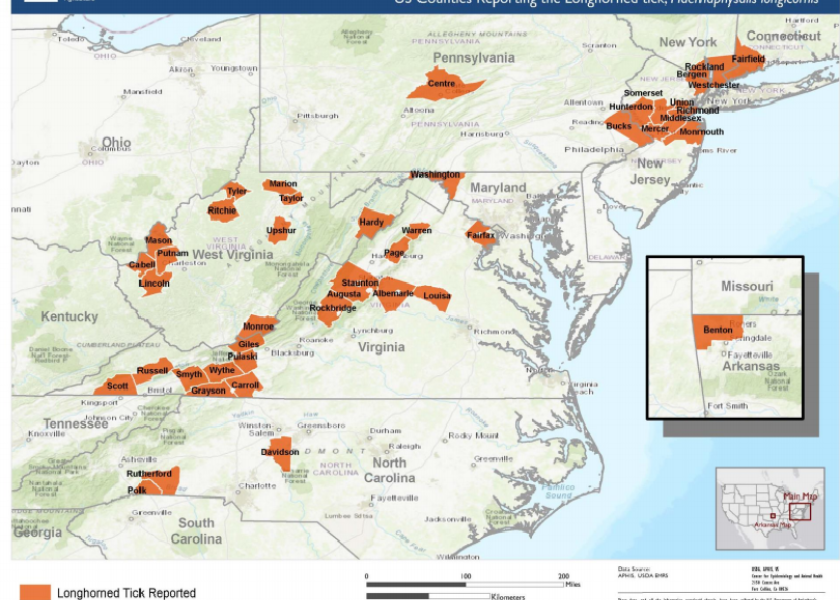A New Tick in Town (Carrying a New Disease)

Since the Asian longhonred tick (Haemaphysalis longicornis) was first identified in New Jersey in 2017, the exotic parasite has spread to at least nine U.S. states, mostly in the East, but also in Arkansas. In much of Asia, Australia and New Zealand, the longhorned tick is a significant and damaging parasite and vector of diseases affecting humans and animals.
Authorities in Virginia have identified the tick in 24 counties, the most in any state.
Concerns over the spread of H. longicornis have increased recently with confirmation of Theileria orientalis (Ikeda genotype) in a group of Virginia cattle. T. orientalis Ikeda is a parasite that causes a disease in cattle that results in major economic issues in Asia, New Zealand, and Australia.
T. orientalis, according to the U.S. Centers for Disease Control and Prevention (CDC) is a tickborne hemoprotozoan with a life cycle that affects erythrocytes and leukocytes and contributes to chronic anemia, ill-thrift, and persistent subclinical infections in livestock. In Australia and elsewhere, the longhored tick serves as the primary vector for T. orientalis. Formerly though, the strains of T. orientalis found in North America had low levels of virulence in cattle.
That all changed though, in August 2017, when seven cattle from a herd in Albemarle County, Virginia, died after showing signs of weakness and malaise. Affected cattle included bulls, cows, and steers ranging in age from three months to 13 years, and all the affected animals were born and raised on the farm.
Investigators also found longhorned ticks on the farm and on the farm’s cattle. After diagnostic testing to rule out Anaplasma, Babesia, and Leptospira in the affected animals, pathologists confirmed the animals were infected with piroplasmid hemoparasites, specifically
T. orientalis, and more specifically, the foreign Ikeda strain, as verified through PCR testing. The Ikeda genotype, according to the CDC report, has been implicated as the etiologic agent of infectious bovine anemia. Subsequent testing of live cattle in the index herd and on adjacent properties found a high percentage positive for T. orientalis Ikeda.
The CDC report notes that in this study, some of the animals that were positive for T. orientalis Ikeda by PCR remained positive five months later, suggesting a chronic state, although the animals that had initially exhibited clinical signs were no longer clinically ill during the spring and summer months. In New Zealand, the authors note, disease caused by T. orientalis demonstrates seasonal pathogenicity, and anemia is more pronounced during autumn and winter months. They also point out that without subsequent testing following negative diagnosis for anaplasmosis, identification of the pathogenic Theileria species might not have occurred, illustrating the need for more surveillance and appropriate characterization of any parasites detected.
Read the preliminary investigation report from the CDC.
The USDA provides this outline on the biology and habits of Haemaphysalis longicornis, or longhorned tick.
For more on this topic, see these articles from BovineVetOnline:
Researchers Predict Spread of Invasive Long-Horned Ticks
TAHC Encourages Vigilance for Exotic Longhorned Tick
AVMA Offers Tick Tips as Exotic Species Spreads







